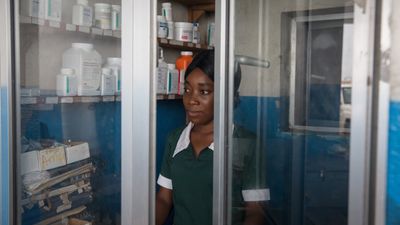Flashbacks to Ebola as the First Coronavirus Case Arrives in Liberia
As Liberia gets its first case of COVID-19, some Liberians are bracing for a shock to its health system while others see a resilient nation better prepared to handle the crisis.
On Monday, Liberia declared its first case of the COVID-19, joining the other countries battling the global coronavirus pandemic. Liberia is now part of a growing number of other African countries—26, now 27—who are experiencing their first cases of the virus since the outbreak began December 2019 in China.
Although Liberia appears to have made immense strides since the 2014 Ebola outbreak—which killed almost 5000 Liberians and many more across West Africa—the preparedness of its health workers and institutions to deal with the treatment of COVID-19 is still a looming question.
RELATED: These are the African Countries That Have Reported Cases of COVID-19
In a live address to the nation, Liberian President, George Manneh Weah, announced that the case was brought to the country from Europe by an official of his government who flouted the rules by refusing to submit to established health protocol. According to Weah, the official from the Environmental Protection Agency, along with a handful of other officials, "chose not to be quarantined, in keeping with the health protocols that were in place at the airport." Mr. Weah announced several new measures, in a bid to halt spread of the virus including stopping flights to and from countries with over 200 cases of the virus and encouraging social distancing.
In January, the Liberian government laid out a set of protocol to stop the spread of the disease into the country, akin to what was done during Ebola. Among the new measures were rules requiring temperature checking at ports of entry and requiring Liberians returning from China to quarantine for 14 days.
At the beginning of the 2014 Ebola outbreak, many Liberians did not trust the government's messaging about an outbreak in the north of the country. Bad governance under the leadership of President Ellen Johnson Sirleaf and unbridled corruption were cited as reasons for this mistrust from the public. The resulting inaction led to the most lives lost of any country at 4,810.
Unlike 2014 when the Liberian legislature was reluctant to mount pressure on the executive, the current members of the legislature, led by Hon. Dixon Seboe has already called an urgent session with health authorities, following the spread of cases beyond China, to inquire about the country's readiness to combat COVID-19.
Currently, the new military hospital outside Monrovia is the only health facility that has been designated and is being prepared to treat cases arising from the virus. During the outbreak of Ebola, many hospitals turned away patients due to lack of training, gloves, face masks, and other medical necessities. This led to several preventable deaths including the daughter of a Liberian lawmaker who was experiencing an asthmatic attack. Following the cessation of the attack, her father brought a lawsuit against the government.
It's not yet known how many gloves, face masks and other necessities the country has within its storehouse. But if recent reports in FrontPage Africa are anything to go by, the county health system is likely to be overwhelmed once again.
The Liberian newspaper has constantly reported over the lack of fuel, gloves, masks at the major referral hospital in central Liberia, where a patient needing oxygen died as well as a pregnant woman.
While the Liberian government is making frantic efforts to prepare for the fight against the new virus, it has failed miserably on a key component that was used to fight Ebola – awareness.
Before the discovery of COVID-19, the government, rather than using the radio, sent SMS alerts via telecom companies debunking reports of the virus being in the country and called on citizens and residents to make use of the hotline number, 4455, which was also used during the Ebola crisis.
Currently only one Liberian media entity, my employer Hott FM107.9 (also online) is running an awareness message on its radio and television network–and it isn't an ad sponsored by anyone. The Hott network, immediately following the spread of cases beyond China, began broadcasting awareness messages, encouraging the public to practice measures laid down by the World Health Organization and providing a general overview of COVID-19.
The immediacy of the network to spot this vulnerability is not a novelty to owner CEO of Hott FM/HOTT TV, Bernard Benson. Known as DjBlue in Liberia, he led the first effort to galvanize Liberians artists to spread awareness over Ebola. This initiative was pivotal in getting people to temporarily suspend their traditions, listening to the pieces of advice from the health workers, and helped in the early detection of cases thereby decreasing the rate of fatality.
Liberia is not out of the woods but the resilience of its people exhibited during Ebola can defeat COVID-19.
Gboko Stewart is a freelance journalist and radio host at Hott FM 107.9 living in Liberia. He's the founder of journalRAGE , Liberia's first LGBT news service. He can be reached at gboko@journalrage.org.
- African Countries With Confirmed Coronavirus Cases - OkayAfrica ›
- Coachella 2020 Postponed Amid Coronavirus Outbreak - OkayAfrica ›
- Davido Postpones North America Tour Amid Coronavirus Outbreak ... ›
- South Africans Call for Travel Ban Amid Coronavirus Outbreak ... ›
- Op Ed: Africa is Not the Center of The Coronavirus Epidemic and the ... ›
- Cameroonian Jazz Legend Manu Dibango Dies - OkayAfrica ›
- Everything You Need to Know About the Marburg Virus Outbreak in Rwanda - Okayplayer ›
- Tanzania Confirms Marburg Virus Case, Mobilizes Emergency Response | OkayAfrica ›
